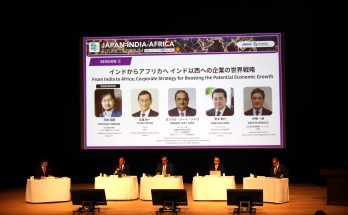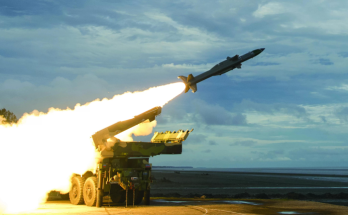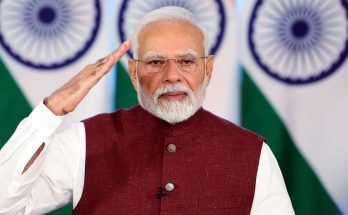ROME: India-Italy relations are scaling new frontiers. The recent visit of Antonio Tajani, Deputy Prime Minister and Minister of Foreign Affairs and International Cooperation of Italy, to India on April 11-12 2025, galvanised bilateral relations across the spectrum and saw the launch of India-Italy Business, Science and Tech Forum.
Against this backdrop, Senator Giulio Terzi, a former foreign minister, speaks to Manish Chand, CEO, Centre for Global India Insights and India and the World, about his assessment of the visit of Italy’s Deputy PM Tajani to India and highlights the growing strategic convergence between the two countries. Highlighting the importance of the India Middle East Europe Economic Corridor (IMEEC) in a fragmented world, he underlines differences between IMEEC and China-led Belt and Road Initiative.
A veteran diplomat, Giuliomaria Terzi di Sant’Agata, better known as Giulio Terzi, served as Italy’s Minister of Foreign Affairs in Mario Monti’s government from November 2011 until March 2013, Permanent Representative of Italy to the United Nations in New York between 2008 and 2009 and Ambassador of Italy to the United States between 2009 and 2011. He is currently a Senator of the Republic of Italy and the President of the 4th Permanent Senate Commission of EU Affairs elected from the Lombardy constituency as a part of Brothers of Italy. He is also the President of the India-Italy Parliamentary Friendship Group.
Excerpts from the interview.
 Q) How do you see outcomes of Italy’s Deputy Prime Minister and Foreign Affairs Minister Antonio Tajani’s recent visit to India?
Q) How do you see outcomes of Italy’s Deputy Prime Minister and Foreign Affairs Minister Antonio Tajani’s recent visit to India?
A) Deputy Prime Minister Tajani’s visit to India focused on advancing the India-Italy strategic partnership and the Joint Strategic Action Plan 2025-2029 that was agreed upon by Prime Minister Modi and PM Meloni in November last year.
Foreign Minister Tajani’s visit achieved many important results. The launch of the India-Italy Business, Science and Technology Forum, in the presence of Italy’s Minister of University and Research, Ms. Anna Maria Bernini, India’s External Affairs Minister S. Jaishankar, and Trade Minister Piyush Goyal was a great success. Minister Jaishankar said that he was very much impressed by the number of people and the enthusiasm at the Forum in New Delhi. Hundreds of visitors, chief executives of companies, entrepreneurs and scientists, attended this forum, which marked a great moment in our bilateral relations. India-Italy relations have been growing at a rapid pace since the first visit by Prime Minister Modi to Rome in October 2021. Since then, high-level visits and meetings have been held frequently.
 The entrepreneurs of the two countries have shown mutual enthusiasm about investing in different sectors, including agricultural business, logistics, infrastructure and consumer goods. The confidence of investors has grown as there is rule of law in both countries. In India and Italy, foreign investors can rely upon an independent judiciary, a free and a fair election, and a democratic government.
The entrepreneurs of the two countries have shown mutual enthusiasm about investing in different sectors, including agricultural business, logistics, infrastructure and consumer goods. The confidence of investors has grown as there is rule of law in both countries. In India and Italy, foreign investors can rely upon an independent judiciary, a free and a fair election, and a democratic government.
Q) The India-Middle East Europe Economic Corridor figured very prominently in discussions during Tajani’s visit to New Delhi. How do you see concrete progress in advancing and implementing this potentially transformational corridor?
A) IMEEC seeks to connect the Indo-Pacific, Mediterranean and the Indo-Mediterranean, thereby enhancing trade and exchanges between Asia, Middle East and Mediterranean Europe. This corridor encompasses key sectors of our strategic partnership and also the strategic partnership with the European Union, because it encompasses regional and global economic cooperation, even defence cooperation in the sense of defence technologies and dual use technologies, especially cyber cooperation.
But it has a relevance also in spreading understanding between people in order to combat terrorism and radicalisation. It also connects companies which are engaged, but also small and medium companies which are engaged in space cooperation, in science, research, education, health sector, cultural exchange and tourism.
So, this is really a global corridor. Minister Tajani signalled the importance of the corridor by announcing the appointment of Francesco Talo as Italy’s special envoy for IMEC, just ahead of his visit to India. He is an outstanding diplomat who has worked closely with Prime Minister Meloni.
The corridor will be a big achievement when completed, and will enhance confidence in the opportunities that exist between India and Italy, between India and Europe and the Middle East region. From Italy’s perspective, the corridor will also help advance our initiatives in the African continent.
Italy has a more equal partnership than many countries in dealing with African countries. There is support for the Mattei plan in the Italian National Parliament as well as in the European Parliament. The Mattei plan encompasses 15 African countries, mostly in East Africa. which are considered, which are connected to the Mattei Plan.
Q) Senator Terzi, do you think IMEEC can emerge as a viable alternative to China-led Belt and Road Initiative?
A) I believe that we are not fighting against anybody. Our philosophy and our policy are not inspired by a sense of fight; we are inspired by a natural and clean competition in the international arena. To compete in the sense as we do in the areas of business and science and technology. It is based on the concept of merit, of honest competition in the sense that competition must respect the rules, must respect freedom, must respect human dignity. Competition is a natural evolution of life, and therefore we believe IMEC is highly competitive with other options.
IMEEC is a product of free, democratic, transparent societies led by the rule of law. On the other hand, the Silk Road is an instrument of domination, appropriation, coercion in many times. If there are other countries or areas of the world which prefer the latter to the previous, it is their own business. They are free to choose — whether they want to be on the right side or wrong side of history. IMEEC provides an alternative in the international arena.
IMEC is a fantastic alternative, an alternative of freedom, which extends to business, to respect of the enterprise, to the fact that when there is a complaint or a dispute, this dispute can be resolved by the international judicial system. Disputes must not be resolved in any way by the use of force, by aggression or by blackmail, or by choking people who have subscribed and grabbing their land because they are much weaker.
Q) What’s been the progress in India-Italy collaboration in defence and defence technologies? Are we moving in the direction of joint production and joint research partnership?
 A) Over the last couple of years, India-Italy defence relations have been growing. This is an area which is also considered also at the European level; it’s a part of the EU-India strategic partnership. In this regard, the conclusion of the India-EU free trade area agreement will be a major step forward. Defence cooperation and cyber cooperation are considered at the European level and at the national level because if there is a free trade agreement, that will be another boost to our cooperation.
A) Over the last couple of years, India-Italy defence relations have been growing. This is an area which is also considered also at the European level; it’s a part of the EU-India strategic partnership. In this regard, the conclusion of the India-EU free trade area agreement will be a major step forward. Defence cooperation and cyber cooperation are considered at the European level and at the national level because if there is a free trade agreement, that will be another boost to our cooperation.
At the national level, it is very clear that there is a fast pace of activity between our two countries, specially since the meeting between the two prime ministers on the sidelines of the G20 summit in Rio de Janeiro in November 2024. During this meeting, the two sides signed the Joint Strategic Action Plan 2025-29 which outlines their vision for the next five years. Under the action plan, India and Italy will negotiate a defence industrial roadmap, and agreement for the mutual protection and exchange of classified information. The two sides also agreed to sign a Memorandum of Understanding between the Society of Indian Defence Manufacturers and the Italian Industries Federation for Aerospace, Defence and Security. The two sides also decided to enhance interactions between respective Armed Forces in the framework of Italy’s growing interest in the Indo-Pacific Region.
Defence cooperation is constantly at the centre of India-Italy cooperation because we have very important Italian companies which have a strategic and international experience, not only in the North Atlantic dimension and European dimension, but even outside it. For instance, Leonardo has close cooperation with British companies and is now considering a very important project with Japan, Italy, UK and Japan on the sixth-generation combat aircraft. The Global Combat Air Programme (GCAP), a trilateral initiative between the UK, Japan, and Italy to develop a next-generation combat aircraft, has just created a legal framework just a few months ago to do it.
Q) How do you look at the growing tendency to use force in the international arena to resolve disputes?
A) Everybody shares the concern for possible aggression against settled borders. It’s a matter of great concern that on a global level the use of force is becoming increasingly common over the last 10 years.
The crisis between countries should be resolved through legal settlement, arbitration, and the application of the international law which completely forbids the use of force unless there is a compelling reason to respond in relation to a clear aggression by another state. In that sense, that is the only case where the use of force is legitimized by the international law.
Instead of that, we have seen members of the international community, even Five Permanent Members of the UNSC using aggression. This position is not shared completely by the EU, but I have to highlight the Italian position, the European and the North Atlantic position.
There has been an aggression against Ukraine by a permanent member of the UN Security Council. A permanent member of UN Security Council has higher responsibilities than all the other members of the General Assembly who comply with the statute of the United Nations. There are so many countries now in the world, and especially European countries, which feel more affected by this aggression.
 There is an urgent need for Europe and the North Atlantic community to bolster defence. There are increasing voices and concerns that the national defence and European defence infrastructure must be improved substantially. At the end of the day, it is only deterrence and the balance of forces in the field, or the balance of forces at the global level, that can guarantee peace against aggression. In a war everybody loses, and every war can end in an unexpected way, as a famous strategist said. It is always very obscure and there is a deep fog every time a war starts, and nobody can predict how it will end.
There is an urgent need for Europe and the North Atlantic community to bolster defence. There are increasing voices and concerns that the national defence and European defence infrastructure must be improved substantially. At the end of the day, it is only deterrence and the balance of forces in the field, or the balance of forces at the global level, that can guarantee peace against aggression. In a war everybody loses, and every war can end in an unexpected way, as a famous strategist said. It is always very obscure and there is a deep fog every time a war starts, and nobody can predict how it will end.
Author Profile

- Manish Chand is Founder-CEO and Editor-in-Chief of India Writes Network (www.indiawrites.org) and India and World, a pioneering magazine focused on international affairs. He is CEO/Director of TGII Media Private Limited, an India-based media, publishing, research and consultancy company.
Latest entries
 India and the WorldMay 8, 2025Pahalgam payback: India exposes Pakistan’s lies, misuse of religious sites for training terrorists
India and the WorldMay 8, 2025Pahalgam payback: India exposes Pakistan’s lies, misuse of religious sites for training terrorists India and the WorldMay 3, 2025IMEEC provides a democratic alternative to BRI: Italy’s former foreign minister (Interview)
India and the WorldMay 3, 2025IMEEC provides a democratic alternative to BRI: Italy’s former foreign minister (Interview) India and the WorldApril 21, 20253T Template for India-US Mega Partnership
India and the WorldApril 21, 20253T Template for India-US Mega Partnership India and the WorldFebruary 14, 2025Modi-Trump COMPACT: India, US launch MEGA partnership for 21st century
India and the WorldFebruary 14, 2025Modi-Trump COMPACT: India, US launch MEGA partnership for 21st century








